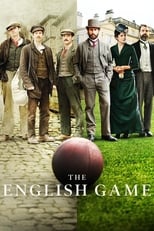A period drama about football is unique. A well-crafted tale in this time of pestilence is a joy and a comfort. The English Game, how football became the people’s game, is elegant soap opera and luscious escapism to a simpler time. Three nights in a row, to close out my shelter-in-place day, I self-administered dollops of this Netflix TV series and then slept deeply, sans souci.
The English Game covers two football seasons around 1880, when a working class man tries to lead his company team to the FA Cup Final. If they reach the Final, they will challenge a team of elites, the same players who run the FA and write and adjudicate the rules of the tournament. The game on the pitch isn’t just a diversion, it is a microcosm for class warfare.
Not just a story about class warfare
And yet the series is not really about the fight between the classes, it’s about the characters’ struggles to defy his or her own class. Writer-creator Julian Fellowes —the lauded author of Downton Abbey and other great works — places money as a key factor in the story, because it is what “ensures the posh stay posh and helps the less rich scramble up the social scale”. Regarding Downton Abbey, Fellowes has said,
“…I would like to see the British allowed to be rich. We live in an odd society where we all want to be rich but are encouraged to hate people who are.”
– Writer Julian Fellowes
Along the vein where rich Brits are not simple villains, we develop empathy for both ends of the class scale. Fellowes’ formula in a series is to have 4-5 characters carry a story each episode, with each character having probably 3 stories over the whole series. This formula and the permeating connections between the characters sustain a soap opera intensity like a book you can’t put down.
For example, player Fergie Suter (Kevin Gutrie) seeks a better life through football by surreptitiously accepting wage bonuses for his play for the mill. Being paid to play is against the rules of the FA. He has conflicts galore: a team that both resents and admires him, an abusive father, questions of loyalty — his list is almost endless.
At the other end of the scale, Old Eton player Arthur Kinnaird (Edward Holcroft) slowly recognizes the unfairness of life. He also sees the future of football and that it can no longer be a game exclusively for gentlemen. Kinnaird must defy friends and family in order to enact change.
Besides relating the story of the first known professional footballers, The English Game tells us that everyone can be more than a cog in a wheel. We can all affect each other, and if we help each other, what a network of good intentions. The story is so apropos for today’s times: how far can we go if we work together to fulfill other’s needs. Maybe that’s what I found so comforting to my psyche.
The creative team
Julian Fellowes and a host of others receive writing credits. Director credits are also shared; woman Director Birgitte Stærmose directed the first 3 episodes, while episodes 4-6 were handled by Director Tim Fywell. While there are bumps here and there in pace and dialog, overall I only realized writing and directing were team efforts when I checked IMDB. So for simplicity, I credit Fellowes for everything about the series, and I might be dead wrong. Apologies.
The soccer
Andy Mitchell served as historical consultant on the series. He hosts ScottishSportHistory.com, has written extensively about the players in this film, and has published several books including one on Arthur Kinnaird.
Old Eton play more of a rugby-style, while Fergie and his buddy Jimmy Love teach their company team to pass and let the ball do the work.
For me as a referee, it was interesting to see the game official in top hat and suit and not doing much to control the game. Most of the soccer shown is fouls and tackles, and you don’t come away with much feel for the game, but you get an idea of the fans.
As covered in Guy Oliver’s History of Soccer, this was a time period when football was beginning to become a spectator sport. A league schedule was eventually developed in order to create consistent income. But prior to that, games were friendlies and the only large tournament format was the FA Cup.
As a costume drama, it was interesting to see the players’ uniforms and the storyline of how an enterprising millworker-footballer starts his jersey-making company.
Historical accuracy
Whenever you watch a drama, remember that it is fact-based fiction, but fiction nonetheless. The timeline of games is compressed into one Final. The characters in The English Game are based on real people, but their storylines are for dramatic effect. Please don’t let that detract from your enjoyment of this terrific show.
The overall facts are true: that young men were paid to play before it was allowed; that professionalism led to the immense popularity of the sport; and that the gentleman’s game was overtaken by the people’s game.
Also note: I have never watched Downton Abbey.
9 Soccer Movie Mom Rating = 9
Resources:
- Released: 2020-03-20 (Netflix)
- IMDB
- WIKI
- Director: Birgitte Stærmose (Episodes 1-3) , Tim Fywell (Episodes 4-6)
- Stars: Edward Holcroft , Kevin Guthrie
- Watch the Trailer
- Netflix Website

